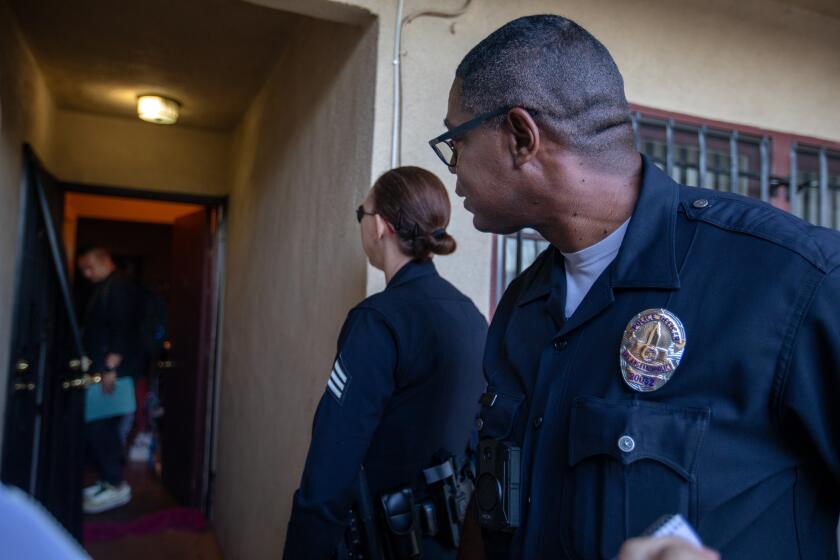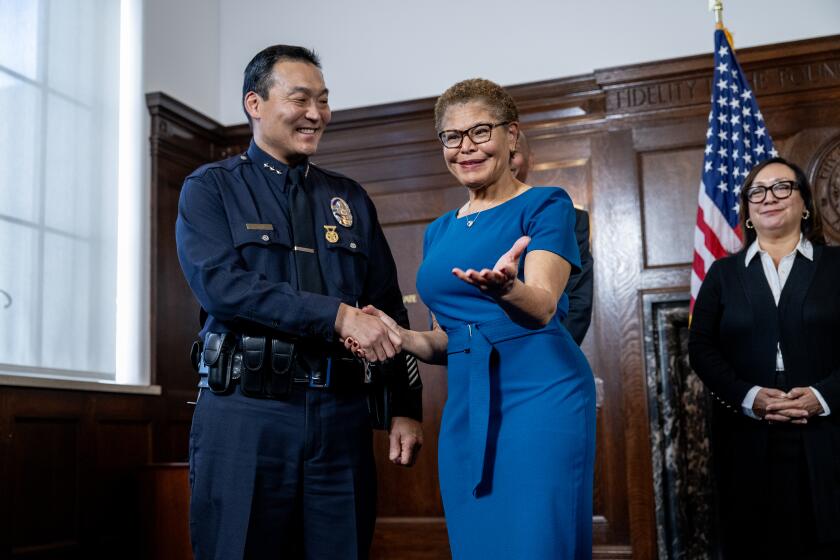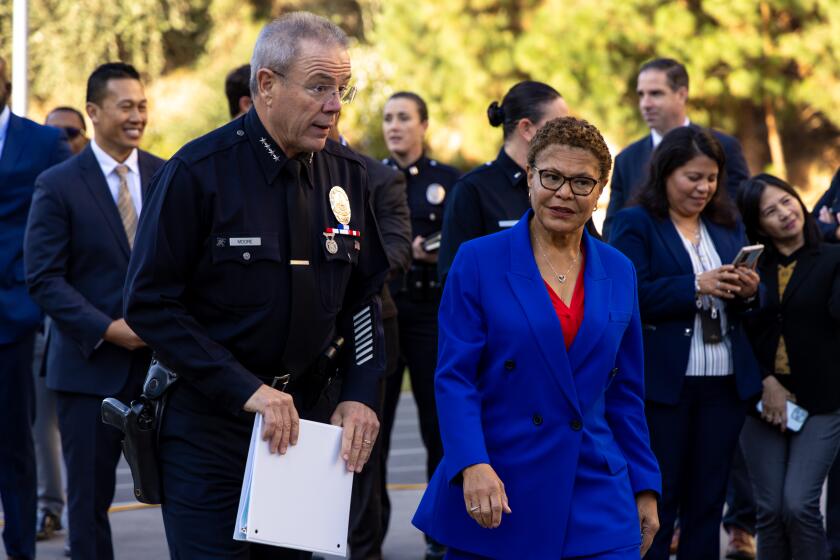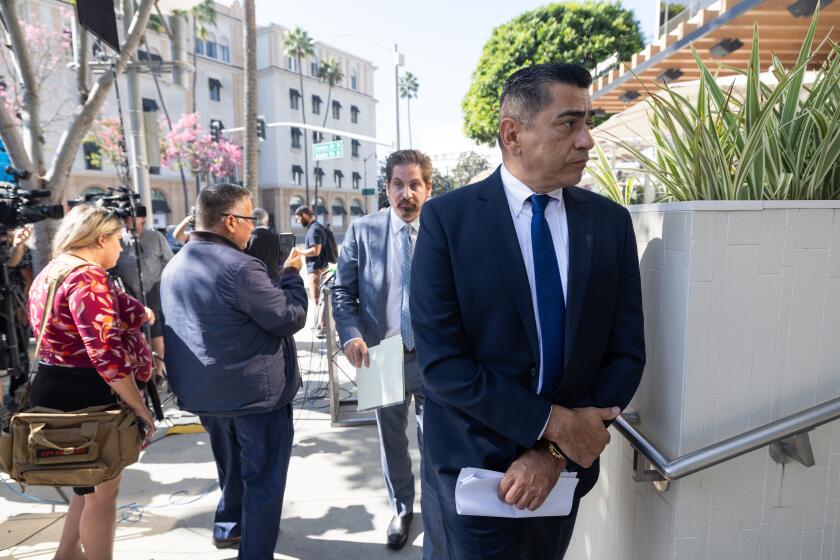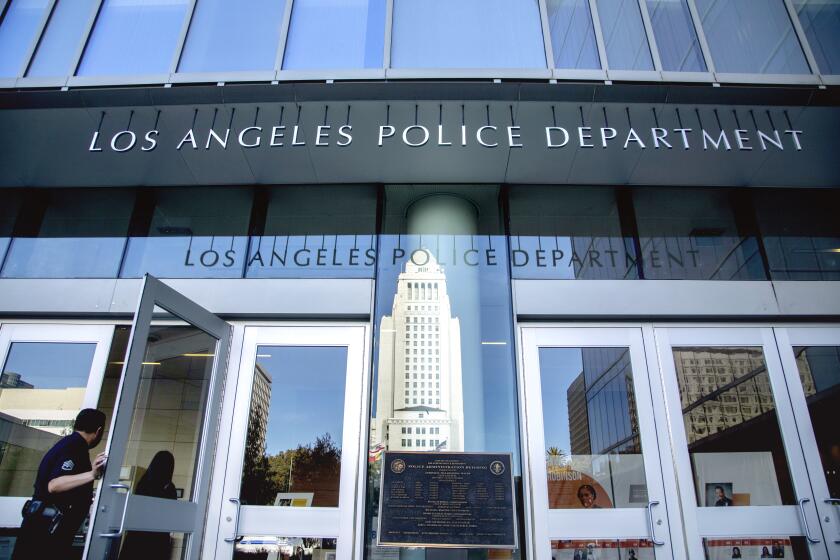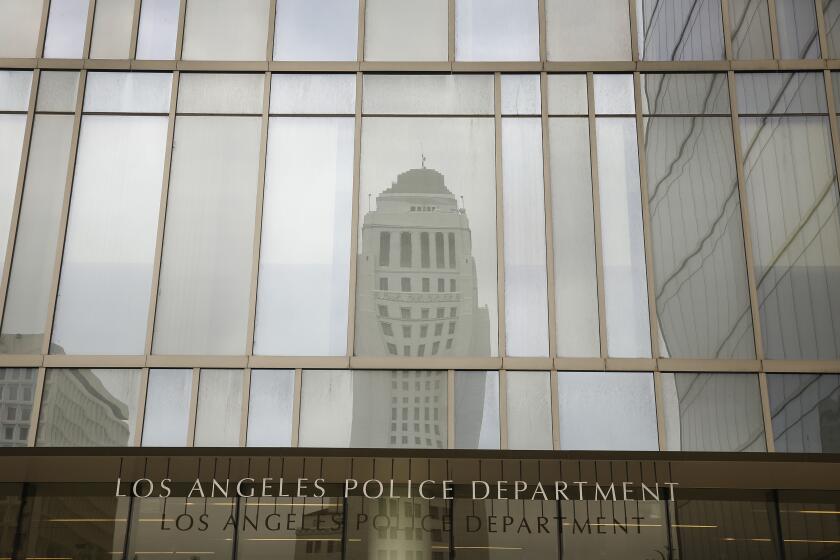LAPD interim chief Dominic Choi: Quiet reformer or ‘Michel Moore 2.0’?
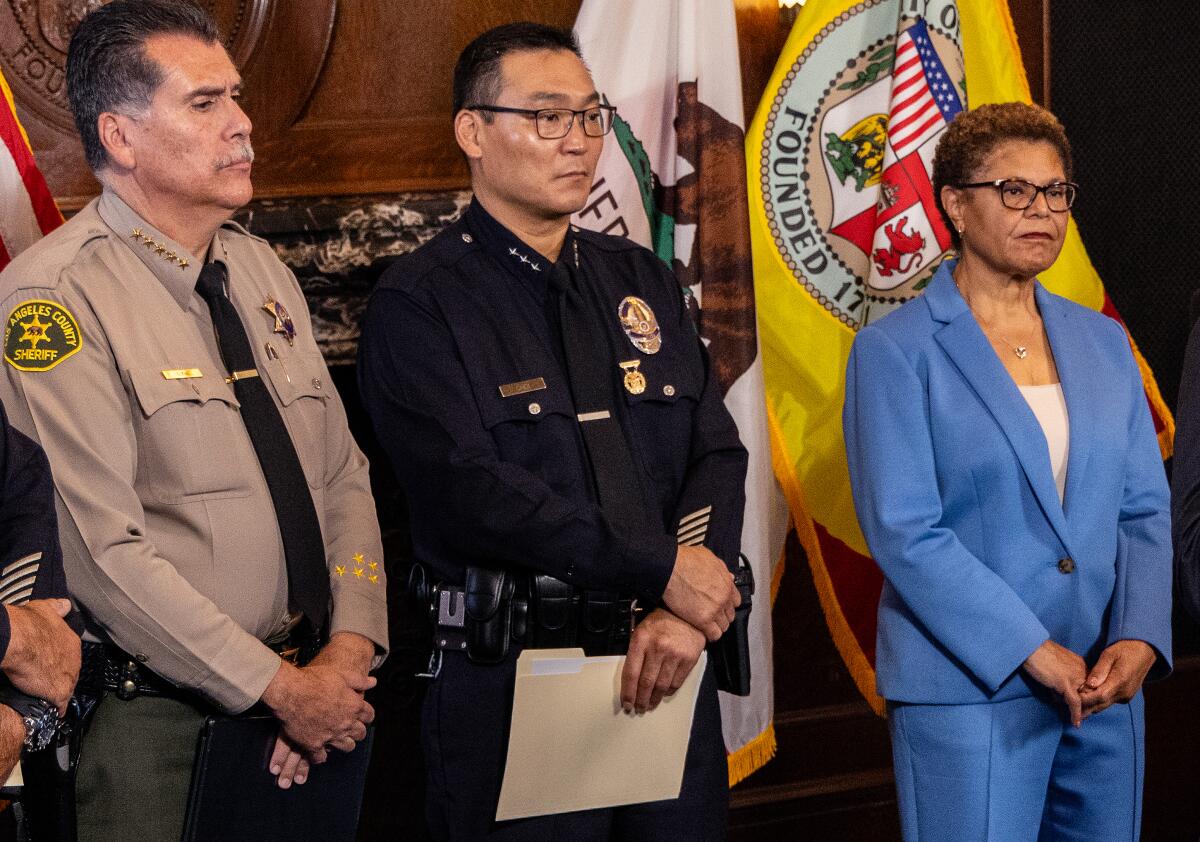
- Share via
Nearly two hours into a welcome ceremony last month at the lavish home of a Korean diplomat in Hancock Park, the guest of honor — the first Asian American to lead the Los Angeles Police Department — had yet to step on stage.
Dominic Choi took over last month as LAPD’s 58th chief, and since then he has managed to keep a relatively low profile, so far avoiding the kinds of headline-grabbing controversies that plagued the department in recent years. After a performance by a traditional nanta-buk drum troupe at the diplomat’s soiree, more than a dozen speakers paraded to the microphone to tell about Choi’s open-mindedness and modesty.
“He doesn’t like all this, this spotlight, this party,” said KCAL news anchor Suzie Suh, the event’s emcee, motioning around the audience of Southern California elites in power suits and high heels.
When Choi finally came onstage to a standing ovation, he joked that his speech would “be a little anticlimactic.” The 28-year LAPD veteran, his voice low and steady, talked about how honored he was to be taking over the “greatest department” in the world from his predecessor, Michel Moore.
Choi worked for Moore at several points in his career, first as an aide and later as his chief of staff. And for some observers, their closeness is cause for concern as the department faces a range of issues that Moore left when he stepped down.
Officer morale is sagging, violent crime has started to climb again in certain neighborhoods, and the number of shootings by LAPD officers is higher than it was at this time in 2023. Recruitment efforts continue to fall short, leaving the department down hundreds of officers and still struggling to fill its ranks with the Olympics and the World Cup looming as security challenges in coming years.
Los Angeles is testing a new approach to crisis response — dispatching teams of unarmed mental health practitioners instead of police officers.
The interim role will continue while the city conducts a nationwide search for a full-term chief, leaving Choi in charge of day-to-day operations for the next several months.
In an interview with The Times last month, Choi reiterated that he sees his role as ensuring “stability in the organization” until the next chief is hired.
“I’m not that guy that’s gonna overwhelm a conversation and continue to try talk over people. I think I learn more from listening to people,” he said.
‘An independent thinker’
Like his predecessor, Choi comes to the chief’s office with a reputation as a policy wonk steeped in the mind-numbing details of running the LAPD, an organization of more than 10,000 employees that is always under an intense media microscope. Where the two leaders differ, the new chief’s supporters say, is in Choi’s willingness to delegate authority even as he climbed the department’s ranks.
His first few weeks on the job were filled with morning-TV appearances and gatherings like the one in Hancock Park. But Choi has also worked behind the scenes at police headquarters to convince his staff that things will be different under his command.
Los Angeles officials have hired a Northern California-based headhunting firm to identify and vet candidates to be the next chief of police.
He has taken a more collaborative approach to leadership than Moore, who had a reputation as a micromanager, according to LAPD insiders not authorized to discuss department matters publicly. In senior staff meetings, the sources said, Choi has encouraged his staff to speak up about changes they wanted to see and he has privately sought counsel from veteran officials who fell out of favor with Moore.
Moore’s supporters saw him as both an experienced leader and an insider who understood the city’s political and labor landscape. But, there was a growing dissatisfaction with his performance among some of his senior staff, which surfaced during a meeting last fall with Mayor Karen Bass.
Eric Rose, a media strategist and former LAPD reserve officer, said the “Michel Moore 2.0” comparisons are unfair to Choi.
“He’s an independent thinker, who is happy to share credit with others and just has no ego,” said Rose. “He may have carried out orders for various issues for Chief Moore, but that’s what any assistant chief is expected to do.”
Controversial promotions
Choi’s appointment was welcomed as a fresh start for the organization, with applause reportedly breaking out on the eighth floor at police headquarters when he was announced as chief. But, in the weeks since, many of his decisions have been picked apart by subordinates for any signs of influence by Moore.
Among Choi’s first acts after becoming chief was the promotion of Capt. Divyesh “John” Shah, a Moore ally who was named in a whistle-blower claim brought by two former internal affairs detectives who alleged they were ordered to investigate Bass. The claim said Shah was present at the meeting where the orders were delivered, allegedly at Moore’s behest.
Two detectives have filed complaints alleging that shortly after Bass was elected, Chief Michel Moore requested an inquiry into the USC scholarship. Moore denied the allegations.
Moore has called the allegations in the detectives’ claim — which surfaced several months before his sudden retirement announcement — “patently false.” Both Bass and Moore have said the claim had nothing to do with the former chief’s departure.
An investigation by the inspector general’s office into the allegations is still ongoing, a spokeswoman confirmed on Tuesday. Shah has not respond to an email seeking comment.
Some within the department also questioned Choi for promoting a female officer named in a police report in the case of former assistant chief Alfred “Al” Labrada. The sergeant allegedly joked about the use of AirTags with Labrada, the report says. Labrada, once considered a possible candidate to replace Moore, was demoted and recommended for termination after he came under police investigation for allegedly using one of the tracking devices to monitor the movements of Dawn Silva, a female officer with whom he was romantically involved.
Both Labrada and Silva, who filed the police report, have lodged legal claims against the city alleging the department mishandled their cases. Prosecutors in San Bernardino County declined to press charges against Labrada, writing “there is no evidence” he was “actively tracking” Silva.
LAPD spokesperson Capt. Kelly Muniz addressed the promotions in question in a brief statement to The Times, saying that department employees “are vetted and selected through the civil service process when eligible for promotion.
“Those referenced were selected in accordance with that process,” the statement said.
One-time LAPD assistant chief Al Labrada has filed a claim alleging mistreatment by ex-chief Michel Moore over handling of allegations against Labrada.
Choi told The Times that he had no plans to overturn his predecessor’s decision to refer Labrada for termination, despite some high-ranking Latino officials privately advocating on the former assistant chief’s behalf. But Choi also said he wasn’t “going to shy away” from making difficult decisions on promotions and disciplinary matters.
Choi also has the backing of Bass, who stopped by the Hancock Park party for long enough to address the crowd, quipping that she had tried to “twist his arm and say, ‘Don’t go for the interim, go for (the permanent) chief.”
However, he has made it clear he’s not in the running to take the reins permanently. City officials said they expect the hiring process to continue through August, at which point Choi will step down and likely resume his previous position as assistant chief.
‘It’s like talking to your grandfather’
The son of Korean immigrants — his father worked for a car dealership in South L.A., while his mother owns a salon in K-Town — Choi grew up in Orange County, where he still resides with his wife and three daughters. Although he’s an outdoorsman who hunts wild boar in his free time, he said he still feels a connection to the city.
As a teenager, he hung out at Holiday Bowl, a late-night institution on Crenshaw Avenue that closed its doors in 2000. He was an undergraduate accounting student at USC when news broke of the acquittal of four police officers in the videotaped beating of Rodney King, an unarmed Black motorist. He condemned the mayhem that followed, but said he understood the deep-rooted anger and pain that fueled the “uprising.”
“I understood the frustration of the community, that tenseness and the build up of the community. I didn’t agree with the way it was carried out, but I understood it,” he said.
Even in seemingly clear-cut cases of serious misconduct, the LAPD’s disciplinary system has led to outcomes in which those involved keep their jobs and continue collecting paychecks. Now, some leaders are renewing calls for a radical overhaul.
Choi’s unassuming style and South L.A. roots made him popular in the community, even as he promoted up the ranks, according to LAPD Lt. Jennie Wong.
“You do see a lot of the command staff sometimes they might have kind of a superiority complex” when they’re in public, said Wong, president of LEAAP, a nonprofit that represents Asian American law enforcement officers. “But Chief Choi really just has this down-to-earth personality; when he speaks to you, you know it’s genuine, it’s like talking to your grandfather.”
Among the most pressing challenges facing Choi is the LAPD’s shrinking size. While officials recently trumpeted a surge in applicants, one city projection suggests that the department could end the fiscal year in June with just over 8,908 officers — potentially the lowest sworn staffing level in over two decades and well short of Bass’ stated goal of 9,500 cops.
“There’s a lot of tension internally because we’re so short-staffed,” Choi said.
Uptick in shootings by police
As with Moore, pressure remains high for the department to reduce its number of shootings. So far in 2024, LAPD officers have opened fire nine times — four since Choi took office — compared to six at this point last year. Two of the incidents proved fatal.
Choi said officers need to do a better job at “disengaging” from situations where there is no real threat of public safety, particularly involving people in the midst of a behavioral crisis.
“Oftentimes, we agitate a situation, we don’t have to take a person into custody,” he said. “Just back away from the scene and we can monitor from afar and watch.”
Some senior commanders have second-guessed Choi’s handling of one recent incident where officers shot a mentally ill man who’d been holding a pellet gun. Video footage of a March 7 incident in the area of 54th Street and Manhattan Place showed one officer continuing to fire shots after the man had tossed away the pellet gun.
Choi has balked at allowing the officer to return to duty after the prescribed 14 days, instead keeping him out of the field longer until he could undergo further psychological counseling, according to department insiders not authorized to discuss the situation publicly.
Activists such as Paula Minor, an organizer with Black Lives Matter-Los Angeles, want Choi and future LAPD leaders to shift the department’s culture, which has produced multiple lawsuits over alleging discrimination against women and incidents of officer misconduct. Minor called for changes “around accountability and transparency, but also within their own department… the way they behave with each other, the misogyny, the DUIs.”
The off-duty lieutenant, Matthew Ensley, was arrested in connection with a crash on the 605 Freeway in Santa Fe Springs that injured at least one.
Choi said he plans to focus on “some of these things where I can immediately help,” including increasing hiring and mental health services for officers.
“What I’m not gonna do is change the whole organizational structure and move everybody around,” he said. Choi said that he was more baffled than offended by a recent op-ed in The Times penned by a longtime civil rights attorney, who wrote that he was “more likely to sustain the LAPD’s vexed status quo than to inspect its inner turmoil.”
He said he anticipated some of the Moore comparisons, but intends to make his own path as chief.
“I think my delivery, areas where I would emphasize or prioritize are maybe slightly different than his,” Choi said. “And so I’m going to carry out policing in the manner that Dominic Choi will do it, not the way Mike Moore would do it.”
More to Read
Sign up for Essential California
The most important California stories and recommendations in your inbox every morning.
You may occasionally receive promotional content from the Los Angeles Times.
